- Home
- Mark Pryor
The Crypt Thief Page 4
The Crypt Thief Read online
Page 4
And in here the air was noticeably cooler. Stands of oak, ash, and maple trees draped their greenery over the monochrome of the tombs, providing relief for the eyes as well as protection from the sun, breathing fresh air into a city of the dead and sustaining the cemetery’s weary visitors.
“You’ve been here before?” Garcia asked.
“No,” Hugo said. “Actually, never. I think it’s the most famous Paris tourist site I’ve never seen.”
“Let me guess,” Garcia said. “You’ve seen too much death in your job, you have no place for it in your leisure time.”
“Something like that. I guess I’ve never really seen the appeal of a few acres of stone, marble, and hidden-away bones.”
“Fair point,” Garcia said. He angled them down a narrower path. “Most who come see more than that, though. To them, this place holds not just the mortal remains of people they love and admire, but their spirits. A place where so many gifted people, so many . . .” He waved his hands as he sought the right word. “So many geniuses lie sleeping. It’s as if death could not possibly destroy all they have to offer, as if a reduction to mere bones in a tomb is impossible.”
“So the ghosts of the famous roam these little streets by night?” Hugo tried not to sound mocking.
“Non, mon ami, I don’t mean ghosts. I mean the essence of these people, all who are gathered here, can exert a powerful influence on those who visit. Ask yourself, why else would so many come? As you point out, there is nothing to see, just stone graves. So perhaps they come here to feel.”
“Perhaps,” Hugo said. “And you?”
Garcia shrugged. “I like the quiet. It is a place where no one hurries, a place where no one tries to talk to you or sell you something. In my humble opinion, it is a place where everyone can find peace and solitude. A few minutes for the living, an eternity for the dead.”
They stopped, Garcia directing Hugo’s attention to a monument on their right. It was a concrete square, head-high and topped with the reclining sculpture of a man lying on his side and holding a paintbrush. His legs extended across the tomb languidly as if he were watching over the cemetery, keeping an eye out for someone to paint, his palette at the ready. Set into the front of the block was a low-relief panel of a picture that Hugo recognized.
“The Raft of the Medusa,” he said. “So the gentleman up there must be Theodor Géricault.”
“I’m impressed,” Garcia said.
“Don’t be. I told you I’ve been to all the other tourist places in the city. This one’s in the Louvre, right?”
“Oui.” Garcia studied the bronze form for a moment. “I like it because it’s less formal than most of the statutes and busts you see on top of crypts here. He looks like he’s enjoying himself a little.”
“He does.” Hugo nodded, and for that same reason he liked it, too.
They walked on in silence, Hugo more interested in watching the couples and small groups winding their way through the cemetery, his curiosity in the dead aroused only when their tombs attracted the gazes of others.
In the shadow of a plane tree, Garcia stopped and turned to Hugo. “Tell me something.”
“Sure.”
“Is there anything else I should know?”
“What do you mean?”
“Is there more to this than meets the eye?”
Hugo hesitated. “I don’t think so. I really don’t.”
“But others do?”
Hugo shrugged. “He’s the son of a senior US senator. She’s a foreigner. Others are concerned, yes.”
Garcia nodded, then said: “Here. Follow me.” The Frenchman stepped off the path at a gap between two head-high, white crypts. Hugo followed and they found themselves standing on a patch of worn ground, with half a dozen other people, all in their twenties or thirties, half of them smoking and all of them silent.
Hugo followed Garcia’s gaze to a row of four low tombs, one of which had drawn these people to Père Lachaise, maybe even to Paris. He looked past two women who stood arm-in-arm, their attention focused on what looked to be a small patch of earth framed by a rectangle of stone and headed by a block that bore a weathered plaque that he couldn’t read from here. A dozen bouquets and the gaggle of tourists were all that set this site apart from the most ordinary gravesite in the cemetery.
“That’s it?” Hugo said, his voice louder than he’d intended.
Garcia smirked and the two women in front of him looked over their shoulders and glared for a moment, before returning to their quiet admiration of Jim Morrison’s final resting place.
After a moment, they moved back to the main path. Hugo walked slowly up and down, eyes glued to the worn bricks and cobbles. Garcia appeared at his shoulder and handed him two crime scene photos showing the precise location of the bodies when they were found. Hugo took a couple of steps to his right and looked down at the spot where Maxwell Holmes had fallen. There was nothing left to see. Much of the spilled blood had soaked into the earth and the rest was impossible to discern; the path itself was stained and discolored from a hundred years of tramping feet. New blood meant nothing here.
A tall, gaunt man in a Doors T-shirt, his long hair pulled into a ponytail, stopped next to Hugo. “American?” he asked.
“Yes,” Hugo said.
“Cool. Which site you looking for, man? I got a better map than—” He looked over Hugo’s shoulder and recoiled at the picture. “Jesus man, what the hell is that?”
“A dead man in a cemetery,” Hugo said, clutching the photo to his chest. “Isn’t that why you’re here?”
“Yeah, but . . . shit, not like that.” The man wandered off, shaking his head, glancing over his shoulder at Hugo.
“A friend of yours?” Garcia asked.
“No. Just some guy who likes his dead a little more seasoned.”
“Ah.” Garcia waved a hand at the scene. “Bien, there is not much to see here.”
“Non. Do they not have security cameras in here?”
“Normally they do. In fact, especially for Jim Morrison’s grave. But those were vandalized a week ago and weren’t working that night.”
“Of course not. So either our man got very lucky or he’s sounding more and more organized. How did he get into the cemetery, can we tell?”
“Non.” Garcia held up a finger. “And there is another mystery. There are cameras at every entrance and covering almost every square inch of the walls. We have looked at those, twice in fact, and do not see anyone coming in. Except Monsieur Holmes and his lady friend, they hopped a wall. We found their rope ladder, too, if you want to see it.”
“Not really. Is it possible he came in during the day and hid somewhere until the gates closed?”
“They try to make sure it’s empty before they lock up every evening, but anything is possible.”
“And the murder was discovered at night.”
“There is a night watchman, he’s the one looking at all the video cameras.”
“Why did it take him so long to get in here?”
Garcia grimaced. “We asked him the same thing. We wondered about some sort of conspiracy, if maybe the couple had paid him to look the other way.”
“And?”
“And it was nothing more than good old fashioned laziness. He told us he would take a long nap while on duty, then rewind the video tapes and watch them on fast forward, to catch up. Then take another nap.”
“Nice system.”
“If you’re not a watchman,” Garcia said.
“Anyway, I assume the cemetery was still closed when the police got here?”
“Oh yes. And I know what you are thinking. But the cameras didn’t catch anyone leaving, and we did a very thorough sweep of the cemetery as soon as we could. That included checking for open crypts he might have been hiding in. Nothing. Nothing at all.”
“So we have no idea how he got in or out?”
“That is correct,” Garcia said. His eyes twinkled. “You don’t suppose . . .”
/> “No, I don’t,” Hugo smiled. “I don’t think we need to consider the possibility that the killer rose from one of these tombs to seek mortal flesh, and then tucked himself back into bed.”
“A zombie,” Garcia said, raising his eyebrows. “Now that would be something.”
“It would.” Hugo patted his pockets at the buzz of his phone. “Excuse me a moment, Capitaine.” He answered as Garcia drifted a polite distance away. It was Tom, and Hugo listened closely. There was no need for follow-up questions, Tom was too thorough for that. When his friend had finished, Hugo asked: “Have you told the ambassador? Or Senator Holmes?”
“Nope,” Tom said. “Thought I’d run it by you first. If I tell them, they’ll have questions I can’t answer.”
“You think I can answer them?”
“No, but if we tell them together I’ll have someone else to look like a dumbass beside me.”
“That’s what friends are for.”
“Damn straight. Sandwiches at Chez Maman first?”
Hugo hesitated. “Sure. I can be there in an hour.” He put away his phone and walked to where Garcia stood with his back to a chestnut tree, resting.
“News you can share?” asked Garcia.
“Yes. The autopsy confirmed that the girl’s skin, the part that was hacked, had traces of ink on it.”
“A tattoo? Interesting. Anything else?”
“No, not really.”
“A long conversation for ‘not really.’” Garcia’s eyes held Hugo’s, but showed more amusement than annoyance. He was letting Hugo know that he knew, that was all.
“It was Tom,” Hugo shrugged, playing the game. “He likes to talk.”
“He is well?”
“Sometimes.”
“A good man, Tom,” Garcia said. He took a deep breath and surveyed the cemetery. “Still works for the CIA, does he?”
Hugo smiled. “Sometimes.”
“That’s what I thought. So if there’s anything else, you’ll let me know?”
“Just as soon as I can, I promise.”
“Bon,” Garcia said. “Because I’d much rather work on this with you than, say, a horde of outsiders.”
“I know what you mean,” Hugo said. “And I feel the same.”
Chapter Eight
Chez Maman hadn’t changed since Hugo had last visited, many months ago. Not surprising, since it hadn’t changed, as far as he knew, in the hundred or so years it had been open before that. This visit was significant, though, because Hugo had not set foot inside since his friend Max had died. Been killed. Murdered. Max, the gruff bouquiniste who’d rested his elbows on each one of these wooden tables over the years, often with Hugo sitting across from him.
Chez Maman, hidden in plain sight, its soot-stained, plaster walls and grubby windows like camouflage so even though it sat less than a block from the Seine, Hugo had walked past it a hundred times without seeing it, without noticing the battered wooden sign over the door, and a place that Hugo would have walked past a hundred more times if Max hadn’t bidden him enter.
The owner, “Maman” was the only name Hugo had ever heard, initially cast a suspicious eye over the American because this wasn’t a bar for Parisians in suits, let alone foreigners wearing them. No, this was a bar for the men who kept those Parisians happy, its workers, its sweepers, its street-side booksellers. But over the two years that Hugo had been coming, Maman warmed to him, trusting him because Max did and because he didn’t act like any American she knew. Maman, with her shock of orange hair, her half-smoked cigarette, and trailing her oxygen tank whenever she stepped out from behind the bar to clear tables, which was not often.
A place like this, yellowed on the inside from a century of filterless cigarettes, held onto history, and when Hugo stepped across the threshold he felt Max’s absence, felt disloyal almost, coming to their watering hole as if nothing were wrong. He paused inside the doorway to let his eyes adjust, as always, and when they did he saw Maman staring across the bar at him. He nodded, as always, and looked around for Tom, somehow and for some reason a kindred spirit to the old woman from the first day Hugo had introduced them. His friend was like that, especially with people who served drinks.
Tom was in the far corner, a glass and a half carafe of red wine in front of him, sitting where he could see everyone who came and went. Hugo felt his gaze as he moved to the bar. Tom would know this was hard. By the time Hugo got there, Maman had poured a whisky and set it on the bar, a statement of understanding in a chipped tumbler.
“Salut,” Hugo said.
She nodded, her eyes holding his, a woman who threw looks and not words to make herself understood. I’m sorry.
Hugo looked at the drink. “Merci. But a little early for the hard stuff,” he said.
She looked at him again and he felt a fool. He picked up the glass and together they said it.
“To Max.”
Hugo tipped the whisky back, feeling the burn in his throat. When he put the glass down she swept it from the top of the bar without a word, sentimentality done with, a luxury this bar did not indulge.
“Tu veut manger?” she asked.
“Oui,” he said. “A sandwich, whatever you have. And coffee. Same for Tom.”
She nodded and retreated, their moment over.
“OK?” Tom asked, when Hugo eased into the seat opposite him.
“Sure.” Hugo watched him, wondering if he’d misheard the heavy tongue in his friend’s mouth.
“Where’s the frog?”
“I assume you mean Capitaine Garcia?”
“Yep.”
“He had work to do. Kind of like us, only we’re here,” said Hugo. “Have you been drinking?”
“I just saw you take a belt of the hard stuff. You really gonna lecture me?”
“I’m your friend, not your dad. But yeah, Tom, I am. You’ve been drinking like a fish for months now.”
“Bullshit. A year at least.”
“Then maybe it’s time to ease up. Especially before noon.”
“I’m doing this for my liver, spreading it throughout the day to make it less concentrated.” He held up his glass. “Medically speaking, this is very sensible.”
“Not amusing, Tom. We’re supposed to be working—at least, I am. God knows what you’re supposed to be doing. Anyway, I’m not getting paid to sit around with drunks in bars, I know that much.”
“Ah, I get it.” Tom wagged a finger. “This is your place with Max, that the thing?”
“Yes, Tom,” Hugo sighed. “That’s it exactly. You jealous?”
“Sure, if I can use it as an excuse to drink.” Tom put his forearms on the table and Hugo leaned away from the smell of his breath. “You’re a big boy, Hugo. You had to come back here sooner or later. And you got the guy who killed Max, remember that.”
“Time to move on?”
“You know what I always say.” Tom raised his wine glass and sipped, then put it down with care. “It’s always time to move on in our profession.”
“Never heard you say that, Tom. What are we doing here?”
“Waiting for sandwiches. Maybe getting drunk.”
“You’re there already. Maybe you should slow it down a little?”
“Maybe you should catch up.”
“With you staying at my place, I feel like I have been.”
“Is that a problem?”
“Which, the drinking or you staying?”
“Either one.”
“I like having you there but as your unpaid landlord I’m banning alcohol from the premises.”
“Fuck you, boss.” Tom smiled innocently as Maman dropped plates in front of them, each bearing a half-baguette stuffed with ham and brie.
Hugo picked his up. “You had something to tell me?”
“Yep,” Tom said. “Have a look at this.” He pulled a piece of paper from his shirt pocket and unfolded it on the table, smoothing it out with a palm.
Hugo read the title across the top of the page. “A
press release?” he said. “Seriously?”
“I know. Our dear senator’s idea. You know politicians, if their mug isn’t in the paper or on TV then they get hives.”
Hugo picked up the page. “This is the worst idea possible. Whether it’s a terrorist or some random punk with an itchy trigger finger, this is the worst possible idea.”
“I know.” Tom belched into his sandwich. “Look, his son is dead and he wants the world to know how angry he is, he wants the killer to know he’s going to take revenge.”
“Thanks, Dr. Phil, I’m sure you’re right.” Hugo absently took a bite as he kept reading. “But still, this is unbelievable. Ridiculous.” He tapped the page in front of him. “‘The public is asked to be ever more vigilant and to assist the authorities in locating Mohammed Al Zakiri.’ How about we give the authorities a few days to catch the guy themselves. Assuming he’s even the sinner, here. And tell me we’re doing this to humor the senator, not because we’re seriously thinking of sending this crap out to the media?”
“Not gonna lie to you, sorry. I know for a fact Holmes is intent on it going out, whether we like it or not.”
“And Taylor?”
“An awkward position for him. I imagine he’s trying to find reasons not to. Can we give him a few?”
Hugo threw the paper onto the table. “How about the fact that we don’t let politicians run our investigations? How’s that for starters?”
“Weak. What else?”
“I thought we’d agreed to play this tight, to try and get our hands on Al Zakiri without him even knowing he’s a suspect?”
“Yeah, well,” Tom said, taking a long drink of wine, “depends on who ‘we’ is.”

 The Book Artist
The Book Artist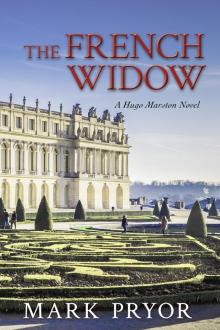 The French Widow
The French Widow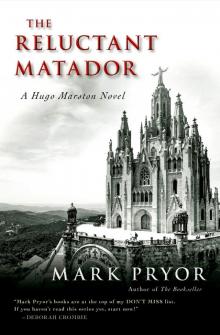 Hugo Marston 04 - The Reluctant Matador
Hugo Marston 04 - The Reluctant Matador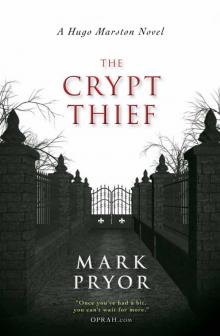 The Crypt Thief
The Crypt Thief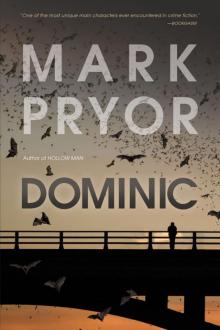 Dominic
Dominic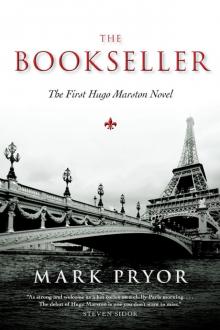 The Bookseller
The Bookseller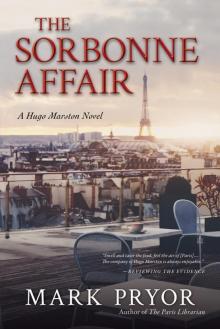 The Sorbonne Affair
The Sorbonne Affair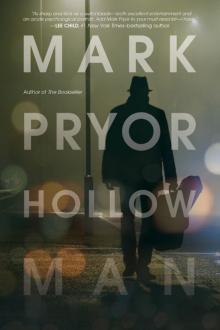 Hollow Man
Hollow Man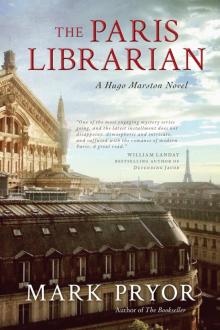 The Paris Librarian
The Paris Librarian